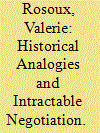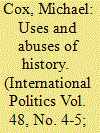|
|
|
Sort Order |
|
|
|
Items / Page
|
|
|
|
|
|
|
| Srl | Item |
| 1 |
ID:
167454


|
|
|
|
|
| Summary/Abstract |
This article questions the role of historical analogies in reaching – or not – effective and durable agreements. It compares two emblematic cases, the Israeli-Palestinian case and the Franco-Algerian case, and focuses on the tension that exists between the weight of the past and the need to move forward. The purpose of the article is not to reduce the hardest cases to their historical dimension. It is rather to show that the ways in which the memories of past events are interpreted, misinterpreted, or even manipulated create the context that shapes peace processes. The analysis is structured on the three main functions attributed to historical analogies: representing the unfamiliar, assigning social roles, and framing action. The examination of these functions helps us to better understand how negotiators and mediators can try to live with the memories rather than without them or against them.
|
|
|
|
|
|
|
|
|
|
|
|
|
|
|
|
| 2 |
ID:
131474


|
|
|
|
|
| Publication |
2014.
|
| Summary/Abstract |
This article explores the historical reasoning behind counterinsurgency thinking, particularly as applied to Iraq, using Douglas Porch's book, Counterinsurgency: Exposing the Myths of the New Way of War as a reference point. It argues that the classic historical analogies of counterinsurgency theory were inapt in dealing with the conflict in Iraq, and that the historical reasoning behind counterinsurgency more generally deserves greater scrutiny. Not only are the analogies of questionable applicability, but the evidence of causation in prior conflicts is ultimately unproveable. In the end, Counterinsurgency theory and the US Army's Field Manual 3-24 on Counterinsurgency were politically useful during the 'Surge', beginning in 2007, but remain intellectually and historically problematic.
|
|
|
|
|
|
|
|
|
|
|
|
|
|
|
|
| 3 |
ID:
106348


|
|
|
|
|
| Publication |
2011.
|
| Summary/Abstract |
In the by now extended debate about the end of the Cold War and its causes, very little attention has been paid to the role played by historical memory in helping shape the way policy-makers approached the collapse of the post-war order. As this article shows, many, if not most policy elites at the time, confronted the passing of the old world with a great degree of caution and trepidation; and one of the key reasons they did so, it is argued here, is because of their reading of the past. This reading, I go on to suggest, made many of them especially cautious and fearful when faced with great change. In the end of course these changes proved irresistible, and for liberals at least seemed to augur in more peaceful and prosperous times. However, as we shall see here, this unguarded optimism was not much in evidence as the old international system and the other superpower collapsed after 1989. Looking backwards rather than forwards, policy-makers approached the new dawn with much less enthusiasm and optimism than their public pronouncements seemed to indicate at the time or later.
|
|
|
|
|
|
|
|
|
|
|
|
|
|
|
|
| 4 |
ID:
159838


|
|
|
|
|
| Summary/Abstract |
This article analyses how Chinese media make sense of smog and air pollution in China through the lens of London's past. Images of London, the fog city, have figured in the Chinese press since the 1870s, and this collective memory has made London a powerful yet malleable tool for discursive contestation on how to frame China's current air pollution problem, which constitutes part of news media's hegemonic and counter-hegemonic practices. Although the classic images of London as a fog city persist to the present day, the new narrative centres on the 1952 Great Smog, which was rediscovered and mobilized by Chinese news media to build an historical analogy. In invoking this foreign past, official media use London to naturalize the smog problem in China and justify the official stance, while commercialized media emphasize the bitter lessons to be learned and call for government action.
|
|
|
|
|
|
|
|
|
|
|
|
|
|
|
|
|
|
|
|
|